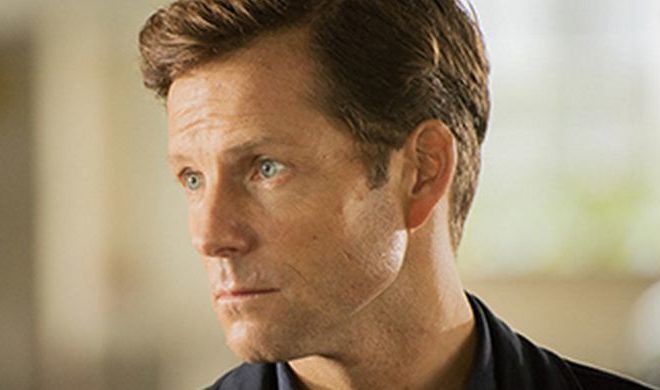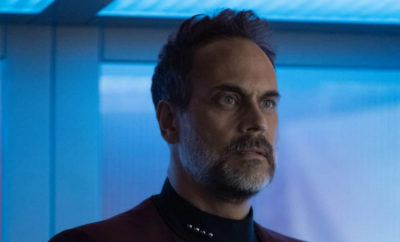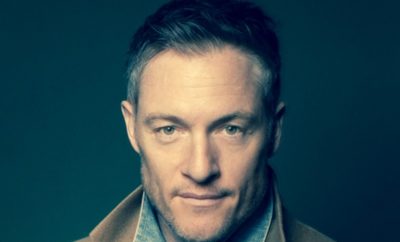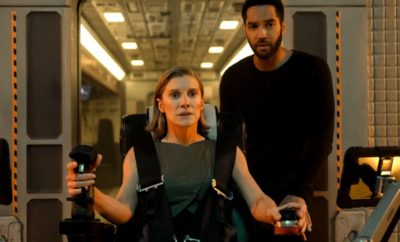
Interviews
Jamie Bamber – Strike Back
By: Jamie Steinberg
Q) What are the recent projects that you are working on?
A) I did “Strike Back” for six months until just before Christmas so I’ve been taking it easy. We moved back to London so I’m just getting adjusted to a new life after three years in France and then all those years on the West Coast in California. My wife is away doing a play in Copenhagen so I’m just keeping the home fires burning at the moment.
Q) What is new this season on “Strike Back?”
A) Me! [laughs] I’m playing this new commanding officer for Section 20. We jump into bed (so to speak) with a Russian FSA agents that we are codependent upon. That’s really intriguing that is new this year that wasn’t there last year.
Q) How was your character Col. Alexander Coltrane originally described to you?
A) He was described as “what if James Bond became M.” I got sent a full character description and there was the sentence that jumped out at me. I’m a huge James Bond fan and have been since I was a kid. The chance to play someone with that kind of special forces accomplishments that can handle himself but is now in a leadership role having to let other people do it I thought was pretty cool. He’s also coming back from a severe career setback in which he’s lost many young men in Afghanistan. He’s hit the bottle and been in forced semi-retirement ever since so this is a shot at redemption for him.
Q) What made you want to be a part of the series?
A) For me, to play the authority figure…I guess I’m middle aged now. I’m in my forties and it’s time for me to step away from the younger roles that I’ve been lucky enough to play in the past. This is me going from Apollo to Adama, in “Battlestar” vernacular. It was that aspect, really. Also, the idea of playing someone with a difficult past – demons – who is fighting to regain control of his career but in doing so he’s presented with a huge challenge, which is controlling this fairly uncontrollable group of independent soldiers who freelance and freewheel and don’t really respect authority. They represent his greatest challenge. He has to gain their respect in order to gain his own self respect and the image of himself back – to put his career back on the rails as it were. It’s a classic character faced with great identity angst and having to overcome a sizable obstacle he needs to achieve in order to regain his own self esteem. That’s always fun to play.
Q) Were you familiar at all with any of your “Strike Back” costars before working with them on the series?
A) No. I really was not. I didn’t know anyone personally other than Bill Eagles who directed the first and last episodes. He had directed me in “Battlestar” for one episode back in 2006. So, I knew Bill. I had met Andy Harries who is the EP and head of Left Bank Pictures way back about “Strike Back” before it ever really turned into a TV show. I knew him a little, but not really. I knew a couple of the other directors as well. But I didn’t know any of the cast. I had never met anyone in the cast before, so it was useful in a way because Coltrane is meeting people he doesn’t know and has to gain their trust and take control. Art and life went hand-in-hand to some degree, but they couldn’t have been more unlike Section 20. They were really warm and welcoming. We became very close over the six months. It’s no irony really that the word “company” is attached to a military unit as well as a theater company. We very much were a company by the end in both senses.
Q) Was there anything you added to Coltrane that wasn’t necessarily in his initial breakdown?
A) I tried to bring as much dry humor to it as I could. I’m not sure how much that is necessarily in the original. I was trying to bring to life what Jack [Lothian] had described to me before hand and what was in the scripts. The nature of “Strike Back” is that we don’t do a lot of purely character driven work. The character has to reveal itself in the stress of being under fire. That’s really why the show works. It’s not indulgent in that way. I guess you have to bring whatever it is in the subtext and in the way the character behaves when having to get stuff done. So, inevitably then the actor brings whatever their physicality and whatever their vocal tone to certain stressful situations. My mantra was that Coltrane was fighting for control over himself, over his surroundings, over those beneath him and over his career. I don’t know if that’s something that Jack had thought about, but that was really the mantra for me – his white knuckling control.
Q) Was there any physical prep that went into getting into character?
A) I didn’t do anything other than my usual fitness regime, which I try to continue just for my own personal well-being because I thought he’s M now rather than James Bond. So, I thought he’s going to be behind a desk now in bunkers behind the liens communicating and that was certainly the case in the first couple of episodes. That’s what I’d geared myself up for. As soon as I got there, I noticed some raised eyebrows and it was sort of suggested that I use the personal trainer that was on offer – which I did. I don’t need to be asked twice to use something like that. But then suddenly they decided to feed me four protein rich meals a day on set just like the other guys who were working out with every spare second that they got. So, I firmly put two and two together and thought, “Oh, they are expecting me to look like I’m in serious shape.” Then, they said, “Yes, we’re going to put you out in harm’s way towards the back end of the show. That happened pretty quick in the second block. We started having to see Coltrane having to think on his feet and use his physical skills. I’m so grateful for that because you’re not really in “Strike Back” if you’re doing any hand to hand combat and firing endless rounds of ammunition at bad guys. So, I was very grateful that they saw the character in that way, and they allowed me to go there. By the end I was in great shape and was working out all the time, preparing for fights that were very, very elaborate. That’s the hallmark of the show – doing big movie action sequences on a TV schedule, which is not easy and extremely impressive the way that they pull it off.
Q) What can you share were some of your favorite moments (onscreen or off) from shooting the show?
A) I have one moment which really stands out for me. We had one whole day… Alin [Sumarwata] (who plays Gracie Novin) and I were in a military dive bar and within the scene we have this wonderful tête-à-tête of getting under each other’s skin really. The characters are chalk and cheese and it’s the first real time that they ever have any time to exchange dialogue and then she throws him under the bus and starts a bar fight, which he has to finish. That day was spectacular. All we did all day was that scene that then developed into a bar fight with pool cues and billiard balls and Russian soldiers with me in the middle of it. That was it. I’ve never been in a bar fight before and I sent an email to Jack at the end saying it was the most fun I’d had on set for ten years, which is an absolutely true.
Q) What do you think it is about “Strike Back” that continues to make it such a fan favorite?
A) It does what great action buddy movies do on a weekly basis on television. I think that’s really it. It’s a ten-hour Mission Impossible or a ten-hour Bond film. People love that kind of movie. They get to see it serialized on television with a crew and producers who know how to deliver really, really high-level special effects rather than visual effects and action three times an episode for ten episodes. There has never really been another television series that attempted to do that, and it really pulls it off.
Q) Is there anything else you want to be sure we share about this season of “Strike Back?”
A) I’m very proud of the show. I’m very proud of everyone in it. I was hugely impressed by the core cast that we met last year – Warren [Brown], Dan [MacPherson] and Alin who carried the mantel over from Sully [Stapleton] and Phillip Winchester who did such an amazing job for so many seasons. It’s that continuity that’s really important. And Warren, Dan and Alin are an extraordinary threesome. They are so accomplished with tactical skills and weapon skills that they put in so much time off camera making sure that they know exactly what they are doing and are authentic. If there is ever a moment where a former special forces operative finds fault with what we do I can promise you it’s not because those three aren’t aware of the compromise, we have had to make through the logistics of filming. They take it so seriously. It reminds of actually, in a funny way, of “Battlestar Galactica” when Edward James Olmos said at the very beginning, “We’re not making science fiction. This is deadly serious.” It’s that degree of serious on a show like “Strike Back.” You could be a bit dismissive of an action show, but they are not at all. They take it very seriously. They take their representation of military personal very seriously and I think that’s why the show works because you can lace humor on top of that once you’ve got that bedrock. They really have that and it’s down to them. The only thing I’d like to say is to thank them for their professionalism and for welcoming Yasemin [Kay Allen] and I and Alec Newman who are new to the cast this year.
Q) We’d be remiss if we didn’t mention the incredible work and legacy of “Battlestar Galactica.” What did you personally take away from your time on the show?
A) I took away so much on every possible imaginable level – from props, costumes and memorabilia to life-long friendships that will be with me until I leave this life. And everything in between! Lessons, confidence, the self-belief to trust instincts that we developed over that time as actors. Also, the way we communicate between actors, between actors and directors, actors and writers, producers, collaboration, what’s possible – so much. But fundamentally great friends, memories and knowing that we were involved in a moment within long-form narrative storytelling on television as it was and part of the sort of move away from broadcast television to the streaming model. So, there is immense pride in the show and that people still discover it today and it’s still with us. Having said all that, it makes the yearning ever more painful in a way for another such experience. Having experienced it once, you just want it again and it’s very hard to find. That sort of need, I think once you have it is a painful kind of need to have and carry with you and I will always carry it with me because I really, really want to be involved in another experience like it. Although I’m not sure it will happen.
Q) What does it mean to you that the series still stands out as such a fan favorite sci-fi show?
A) It means a huge amount. We all start off with ideals, aspirations, as actors we all want to be challenged after challenge. We want to make a difference and tell stories that matter. And to know all of those things happened over that show that we shot, that it still matters, and that people still watch it just underlines several times what it did mean and what great drama can do. Having been a part of it is extremely special, but a bit of me also dies every time someone says they have just discovered it. The very fact we’re talking about a job that ended ten years ago, while wonderful, also renders the last ten years slightly more painful in the sense that there is not much else people really talk about in the same tone. To some degree, it’s a mixed blessing, but I would never ever want a day when someone doesn’t bring up “Battlestar Galactica” or have forgotten about it because I’m very proud of it. That pride also fuels the hunger for more.
Q) What would you like to say to everyone who is a fan and supporter of you and the work you do?
A) I appreciate their love and their support. I hope to embark on new challenging projects that they will find as interesting and as rewarding and as worthy of discussion and attention as “Battlestar Galactica” was. I’m forever grateful. “Battlestar Galactica” is a dialogue with the viewer and with the media, actually. When it was on the air it was with the media and the media really championed us and saw the potential and saw the challenge that the stories we were telling were throwing down to contemporary Americans because it was so interlaced with what was going on in America and with foreign policy and self-identity and all that stuff. It’s all about that dialogue with the fans, media and the viewers that makes “Battlestar Galactica” work. Without them, it doesn’t mean a whole lot. I’m forever grateful to them and I’m grateful for them passing it on to a new generation every time. It’s wonderful. When that happens, I don’t want to overdo my sense of frustration of not finding another project like it, but that’s what happens when you do have such a rich experience – you do want more. I would never suggest that I don’t want to talk about “Battlestar Galactica,” or I don’t want to meet people and chat about it. That’s not what I’m saying at all. It’s very much alive in me. It’ll always be part of me. I always say I made great friends from that experience and we see each other all the time. “Battlestar Galactica” is always with us. Always.





You must be logged in to post a comment Login